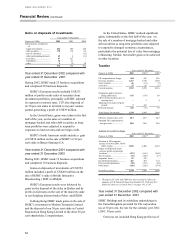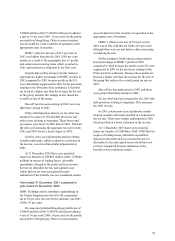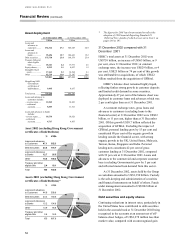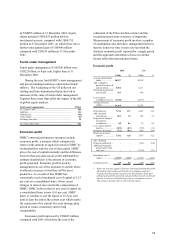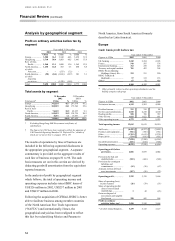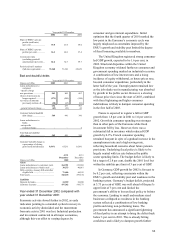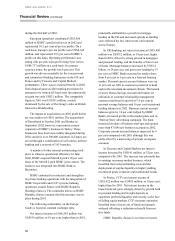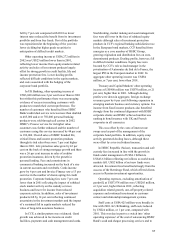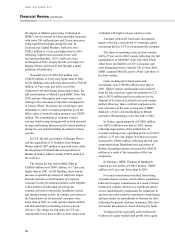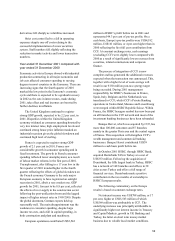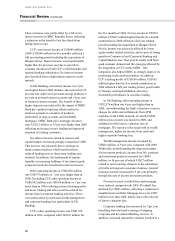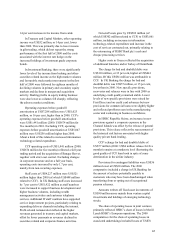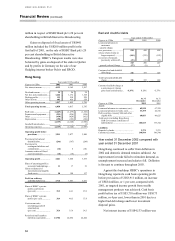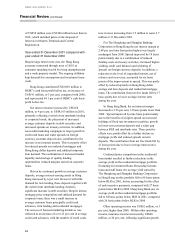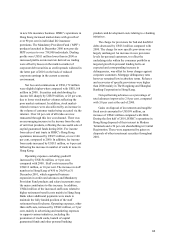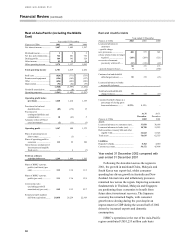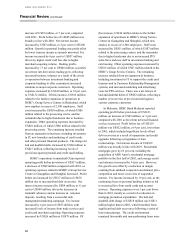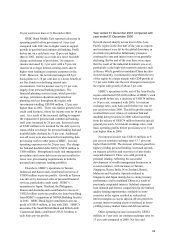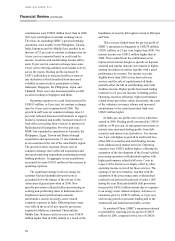HSBC 2002 Annual Report Download - page 62
Download and view the complete annual report
Please find page 62 of the 2002 HSBC annual report below. You can navigate through the pages in the report by either clicking on the pages listed below, or by using the keyword search tool below to find specific information within the annual report.
HSBC HOLDINGS PLC
Financial Review (continued)
60
These increases were partly offset by a fall in net
interest income in HSBC Republic Suisse reflecting
a reduction in the benefit of net free funds from
falling interest rates.
CCF’s net interest income of US$889 million
(2000: US$296 million for five months) reflected a
full year trading period including the acquisition of
Banque Hervet. Interest income was proportionally
higher than the previous year due to growth in
customer advances in both CCF’s retail branches and
regional banking subsidiaries. Net interest income
also benefited from a slight improvement in credit
spreads.
In UK Banking, net interest income was 2 per
cent higher than in 2000. Balance sheet growth of 29
per cent was achieved in personal savings products, 8
per cent in personal current accounts and 14 per cent
in business current accounts. The benefit of these
higher deposits was reduced by the impact of HSBC
Bank plc’s product repricing which resulted in
narrower spreads on a number of products,
particularly savings accounts and residential
mortgages. HSBC Bank plc’s mortgage advances
were US$2.5 billion, or 13 per cent, higher than 2000
reflecting an increase in new lending and improved
retention of existing customers.
Net interest income earned in treasury and
capital markets increased strongly compared to 2000.
This increase was primarily due to earnings on
money market business which benefited from
reduced funding costs as short-term lending rates
declined. In addition, the deployment of surplus
liquidity in increasing holdings of investment grade
corporate bonds also benefited net interest income.
Other operating income at US$6,056 million
was US$370 million, or 7 per cent, higher than in
2000. Excluding CCF, other operating income at
US$4,982 million was US$168 million, or 3 per cent
lower than in 2000 reflecting reduced dealing profits
and lower broking and other securities-related fee
income from investment banking activities. These
were partly offset by increased wealth management
and corporate banking fees particularly in UK
Banking.
CCF’s other operating income was US$1,074
million in 2001 compared with US$536 million for
the five months of 2000. Net fee income at US$781
million, US$415 million higher than the five month
contribution in 2000 reflected a full year trading
period including the acquisition of Banque Hervet.
Net fee income was adversely affected by lower
equity market related activities, and in spite of strong
growth in Commercial and Corporate Banking and
Capital Markets fees. That growth results both from
good customer demand and the synergies allowed by
the integration of CCF within HSBC. This
integration also helped HSBC to strongly improve its
positioning in the eurobond market. In addition,
CCF’s dealing profits of US$190 million, US$105
million higher than the five month contribution in
2000 reflected a full year trading period, good results
in Treasury and Capital Markets and a less
favourable performance in securities trading.
In UK Banking, other operating income at
US$2,976 million was 4 per cent higher than in
2000, notwithstanding the bank’s decision to remove
charges for debit card withdrawals from ATM
machines in the LINK network, on which US$49
million gross income was earned in 2000, and
withdrawal of the loan to valuation fees on
mortgages. The increase reflected growth in wealth
management, higher fee income from cards and
higher corporate banking fees.
Wealth management income increased by
US$66 million, or 9 per cent, compared with 2000.
Within this, notwithstanding the depressed market
for investment products, income from life, pensions
and investment products increased by US$45
million, or 16 per cent of which US$27 million
related to non-recurring elements in the calculation
of profits on long-term assurance business. General
insurance income increased by 9 per cent primarily
through the sale of income protection products.
Personal account overdraft fees and mortgage
were reduced compared with 2000. Overdraft fees
declined by US$41 million, reflecting a reduction in
unauthorised overdrafts. Mortgage fees were US$7
million lower than 2000, mainly due to the removal
of loan to valuation fees.
Corporate banking fees increased by 7 per cent
benefiting from the bank’s strategy of aligning
Corporate and Investment Banking services. In
addition, increased transaction volumes resulted in a


